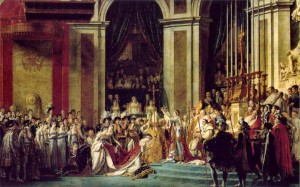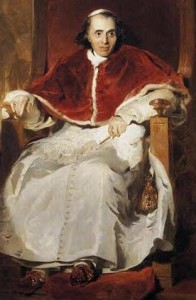Why are popes so often anonymous? Continue reading
I have been reading Margaret Armstrong’s romanticized biography of Edward John Trelawny, a controversial figure associated with the English poets Byron and Shelley. I came across the following pair of sentences that set me off:
[Teresa Guiccioli’s husband] thought that she had been away from home long enough. So did the Pope — from the first, the Pope had taken a benevolent interest in the Byron-Guiccioli triangle.
“The Pope?” I immediately wondered which pope had so little on his plate that he involved himself in one of Lord Byron’s trysts. This common technique of neglecting to disclose the pope’s name is a pet peeve of mine. I cannot list how many times authors have talked about the pope without identifying the man in question.
Does it matter? I think that it matters a great deal. In this case I deduced from the book’s index that the pontiff in question was, in fact, Pius VII, who ruled the Church from 1800 to 1823. If you are interested in the details of his long and arduous pontificate, you can read about them here.
IMHO Pius VII was one of the most interesting of all the popes. He assumed the papacy at a critical period in Church history. His predecessor, Pius VI, had been apprehended by Napoleon’s men and transported to France, where, in fact, he died. Because Rome was considered too dangerous, Pius VII was elected and crowned (with a papier-mâché tiara!) in Venice, which was then controlled by the Austrian Emperor.
A few years later Pope Pius was persuaded by Napoleon to come to Paris as his guest and to crown him as emperor. Not only did Napoleon switch signals at the last minute and crown himself in front of an astonished pontiff (a moment captured not once but twice by Jacques-Louis David), he refused to allow the pope to return to Rome. Until Napoleon was overthrown and imprisoned, Pius VII, along with thirteen of his cardinals, was held captive in France for several years.
The primary title of the pope, remember, is the Bishop of Rome. When Pius was finally able to return to the Holy See, he faced the monumental task of reestablishing order there. At the time the pope was not just the unquestioned ruler of the Church. He was also the king of the Papal States, a territory that stretched across the center of the Italian peninsula. Napoleon had seized these lands, but they were returned to the pope in the Congress of Vienna in 1815.
And there’s the rub. The pope was probably not interested in Byron or Teresa as much as he was in her husband, Count Guiccioli. During the pope’s exile the count had backed Napoleon, and he had made a fortune doing so at a time when most of Italy suffered. After Napoleon had been deposed, Guiccioli somehow managed to retain much of the property that he had acquired in the Romagna, which was part of the Papal States. He was also closely associated with both the Freemasons and the Carbonari, two secret organizations that were thorns in the papacy’s side in the nineteenth century.
From the pope’s perspective, Count Guiccioli had stolen from the Church by aligning himself with a monster who had both humiliated and imprisoned the Vicar of Christ and then joined up with the heretics trying to undermine the papacy itself. So, when Teresa’s father (!) petitioned Pope Pius VII to approve a separation of his daughter from Count Guiccioli, the pontiff probably did not give Byron a moment’s thought. Guiccioli, on the other hand, was already on his enemies list. In short, knowing who the pope was puts a much different twist on the story.
The inability of most authors to distinguish one pope from another seems not to apply to the last two popes. At any given time most people can remember who the previous pope was and how he differed from the current one. So, most people today know that Benedict XVI is as different from John Paul II as Germany is from Poland. But what about the previous popes? I wager that even most Catholics would have a hard time naming JP II’s predecessors (one only lasted a month) and identifying what they stood for. Almost no one can identify any pope who was dead before he/she was born.
I think that that is a shame. The popes are interesting (to me).

 “The Pope”
“The Pope”

